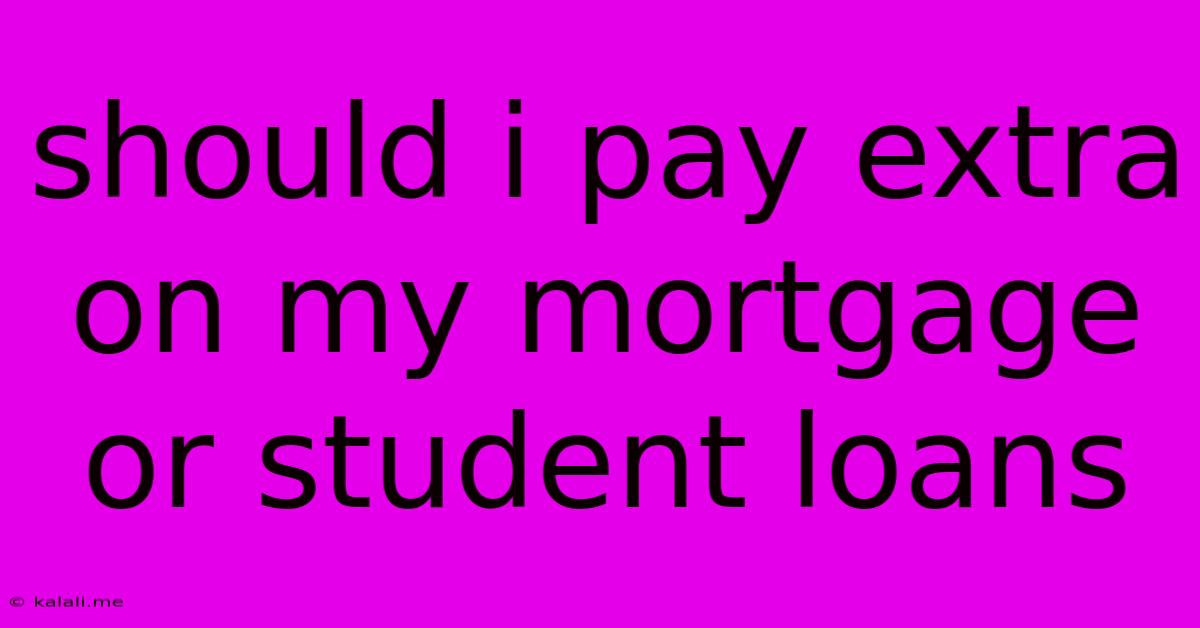Should I Pay Extra On My Mortgage Or Student Loans
Kalali
May 27, 2025 · 3 min read

Table of Contents
Should I Pay Extra on My Mortgage or Student Loans? A Strategic Approach to Debt Reduction
Paying extra on your debts can significantly accelerate your journey to financial freedom, but the question of whether to prioritize your mortgage or student loans often leaves borrowers feeling stumped. This article will help you navigate this decision by examining the factors influencing the optimal approach for your unique financial situation. It's crucial to consider interest rates, loan terms, and your overall financial goals before committing to an aggressive repayment strategy.
Understanding the Trade-offs
Both mortgages and student loans represent substantial financial obligations, but they differ significantly in several key aspects that should inform your payment strategy. Choosing between paying extra on one versus the other involves a strategic assessment of these differences:
Interest Rates: The Key Driver
Interest rates are the most influential factor. Generally, student loans tend to have higher interest rates than mortgages. This means that every extra dollar you pay towards a high-interest student loan reduces the overall interest you'll pay significantly more effectively than the same amount applied to a lower-interest mortgage. This is especially true for private student loans, which often command significantly higher rates.
Loan Terms and Penalties
Loan terms matter too. Mortgages typically have longer repayment periods (15-30 years), giving you more time to pay off the debt. Student loans, while sometimes lasting that long as well, often have shorter repayment periods. Additionally, be sure to check your loan agreements for prepayment penalties. Some loans may charge a fee for making extra payments, negating the benefits of accelerated repayment.
Tax Implications
Tax deductibility can influence your decision. Mortgage interest payments are often tax-deductible, reducing your taxable income and providing a financial incentive to maintain mortgage payments. Student loan interest may or may not be deductible, depending on your income and other factors. Consult a tax professional for personalized advice.
Other Debt Considerations
Don't forget about other debt you might have. High-interest credit card debt should always be prioritized over both mortgages and student loans due to its significantly higher interest rates and potential for accumulating more debt rapidly. Address high-interest debt first, before focusing on lower-interest mortgages or student loans.
The Psychology of Debt Reduction
The satisfaction of paying down debt quickly can be a powerful motivator. Choosing which loan to tackle aggressively can be partly a matter of psychological strategy. Focusing on the loan that feels most burdensome, even if it's not the most financially optimal choice, might be more sustainable in the long run.
Strategic Approaches:
-
The Avalanche Method: This approach prioritizes the debt with the highest interest rate first. This method minimizes the total interest paid over the life of the loans. Ideal if maximizing financial efficiency is the main priority.
-
The Snowball Method: This approach focuses on paying off the smallest debt first, regardless of the interest rate. This method provides a quick sense of accomplishment, which can boost motivation to continue paying down the larger debts. Consider this approach if psychological impact is important.
Conclusion:
The best approach to paying extra on your mortgage or student loans depends entirely on your individual circumstances. Consider the interest rates, loan terms, potential tax deductions, and your overall financial goals. You might even choose a hybrid approach, allocating extra funds to both debts proportionally. Remember to consult with a financial advisor for personalized guidance. Thorough planning and a strategic approach will put you on the path to a debt-free future faster.
Latest Posts
Latest Posts
-
How To Cut Straight With Hand Saw
May 28, 2025
-
How Do You Wipe A Flash Drive
May 28, 2025
-
Can I Use A Window Ac Through The Wall
May 28, 2025
-
How To Find Car Part Numbers
May 28, 2025
-
Tiny Black Bugs In House Slow Moving
May 28, 2025
Related Post
Thank you for visiting our website which covers about Should I Pay Extra On My Mortgage Or Student Loans . We hope the information provided has been useful to you. Feel free to contact us if you have any questions or need further assistance. See you next time and don't miss to bookmark.